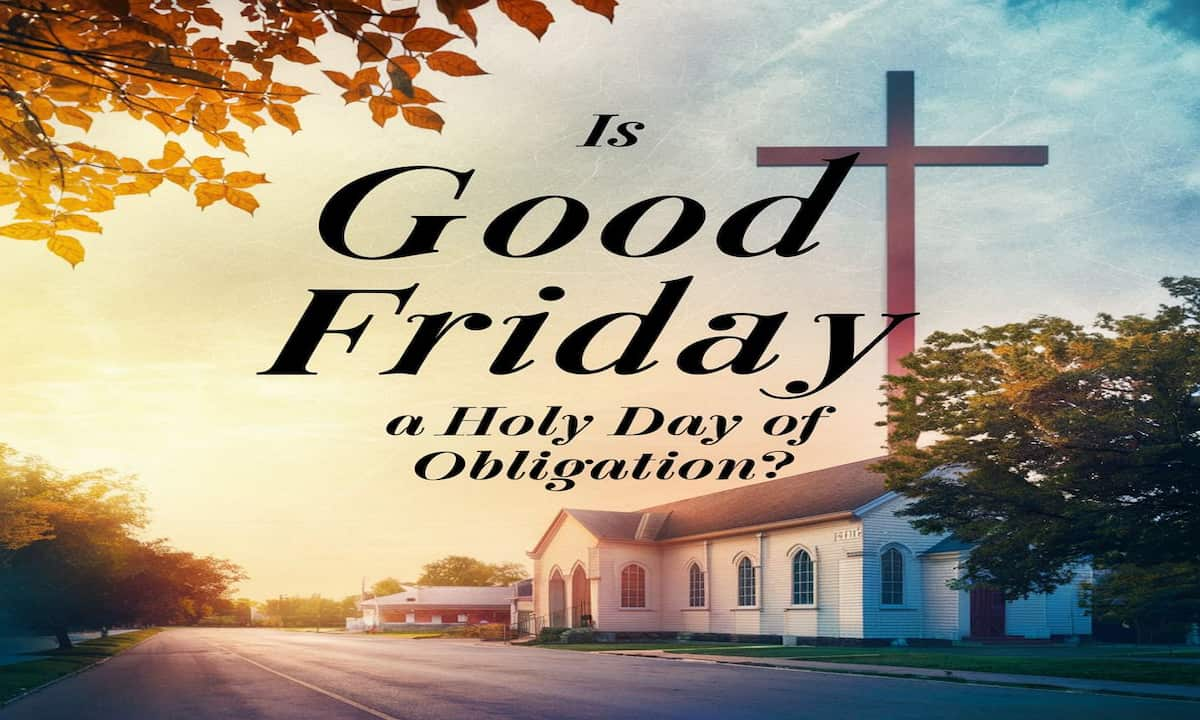Good Friday, the day commemorating the crucifixion of Jesus Christ, holds immense significance in Christianity, particularly within the Catholic Church. It is a solemn day of mourning and penance, marking the culmination of the Lenten season. The question of whether Good Friday is considered a holy day of obligation is one that has been explored and debated within the Church. The principal purpose of jotting down this significant article is to make our valued readers aware of the pertinent question – is good friday a holy day of Obligation? What are different holy days of obligation? And standard practices people follow on good friday!
Understanding Holy Days of Obligation
Within the Catholic Church, holy days of obligation are specific days throughout the liturgical year when Catholics are required to attend Mass and refrain from servile work (with some exceptions). These days are designated to commemorate and celebrate significant events or figures in the life of Christ and the Church.
The holy days of obligation are:
- The Nativity of the Lord (Christmas)
- The Epiphany of the Lord
- The Ascension of the Lord
- The Solemnity of Saints Peter and Paul (except in some regions)
- The Assumption of the Blessed Virgin Mary
- The Solemnity of All Saints
- The Immaculate Conception of the Blessed Virgin Mary
- The Status of Good Friday
According to the Code of Canon Law (Canon 1246 §1), Good Friday is not explicitly listed as a holy day of obligation. However, it is regarded as a particularly significant day in the Catholic Church, and the faithful are expected to observe it solemnly.
While not a holy day of obligation in the strictest sense, Good Friday carries special liturgical and spiritual obligations for Catholics. The Church requires Catholics to abstain from eating meat and to observe fasting on this day. Additionally, the faithful are encouraged to attend the liturgical services commemorating the Passion of Christ, such as the Celebration of the Lord’s Passion, the Veneration of the Cross, and the Communion service.
The Significance of Good Friday
Good Friday holds a profound spiritual and theological significance in the Catholic faith. It commemorates the sacrifice of Jesus Christ on the cross, his suffering, and death for the redemption of humanity. This event is central to the Christian belief in salvation and the atonement for sin.
The solemnity of Good Friday is reflected in the Church’s liturgical practices on this day. The altar is stripped bare, and the celebration of the Eucharist is suspended until the Easter Vigil. The faithful participate in the Veneration of the Cross, a ritual that involves kissing or showing reverence to the crucifix, symbolizing their devotion to Christ’s ultimate sacrifice.
Practices Followed by Masses on Good Friday
Good Friday stands as a day of profound reflection and self-examination for many Christians. It’s a day marked by strict fasting, a practice symbolizing empathy with Jesus’ sacrifice and a commitment to personal renewal. This typically involves one full meal, accompanied by two smaller portions or snacks, with complete abstinence from meat, mirroring the historical context of the day. The Catholic Church offers specific guidelines for both fasting and abstinence, providing a framework for individual observance.
Within the walls of churches, Good Friday unfolds through a powerful liturgy. This ceremony centers around the veneration of the cross, a poignant act of reverence towards the symbol of Jesus’ suffering and sacrifice. Additionally, Holy Communion is offered, a solemn act of remembrance and spiritual connection. The Catholic Church also provides specific prayers designated for this day, serving as acts of reparation for the pain and injustices Jesus endured on his final day.
The Stations of the Cross: A Journey of Reflection
The Stations of the Cross form another cornerstone of Good Friday observances. This devotional practice, consisting of 14 steps, allows believers to embark on a contemplative journey. Each step represents a significant moment in Jesus’ final walk, from his condemnation to his crucifixion and eventual death. Most Catholic churches house depictions of these 14 stations, enabling worshippers to undertake a mini-pilgrimage within the sacred space. As they move from station to station, individuals recite prayers and engage in deep meditation, reflecting on the profound events that unfolded on this momentous day.
Conclusion
While Good Friday is not technically considered a holy day of obligation in the Catholic Church, it holds immense spiritual and liturgical significance. The faithful are expected to observe this day solemnly, abstaining from meat and fasting, as well as participating in the liturgical services that commemorate the Passion and death of Jesus Christ. Good Friday is a day of mourning, reflection, and penance, preparing the faithful for the joyous celebration of the Resurrection on Easter Sunday.

